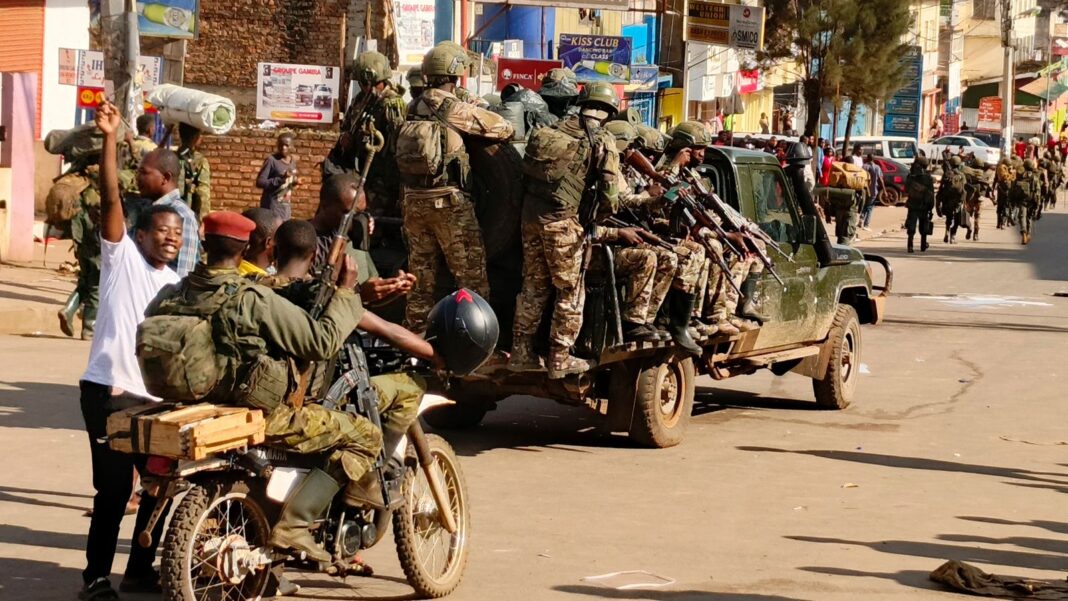Rwandan-backed rebels have occupied a second major city in the Democratic Republic of the Congo (DRC).
The Congo River Alliance, a group of rebel outfits including M23, said in a statement its fighters “decided to assist the population of Bukavu” in addressing its security challenges under the “old regime”.
Alliance spokesperson Lawrence Kanyuka, who previously ruled out a takeover of the city in eastern DRC, added: “Our forces have been working to restore the security for the people and their property, much to the satisfaction of the entire population.”
M23 official Bernard Maheshe Byamungu – who has been sanctioned by the UN Security Council for rights abuses – also told residents they have been living in a “jungle”.
“We are going to clean up the disorder left over from the old regime,” he added.
The Congolese government acknowledged for the first time that Bukavu had been “occupied”, saying in a statement on social media that it was “doing everything possible to restore order and territorial integrity” in the region.
M23 rebels guard outside the South Kivu province administrative office in Bukavu. Pic: AP
South Kivu Governor Jean-Jacques Purusi also told the Reuters news agency that Congolese troops had withdrawn to avoid fighting in densely populated areas.
He said “they’re in my residence already… and my office,” and added he and his staff have safely left the city.
Read more:
Inside Congolese city overrun by rebels
UK facing ‘generational’ security challenge, warns PM
It comes just days after M23 rebels said they seized Kavumu airport, which serves the South Kivu province and is a key strategic location for the Congolese army.
A civil society source in the region told the Reuters news agency on Friday: “The city of Bukavu can no longer hold.”

Map of DRC showing Goma, Bukavu and Kinshasa
Bukavu is the provincial capital of South Kivu, which is located in the mineral-rich eastern DRC.
After the takeover, local resident Blaise Byamungu told the Associated Press news agency that M23 marched into the city, which had been “abandoned by all the authorities and without any loyalist force”.
“Is the government waiting for them to take over other towns to take action? It’s cowardice,” they added.
One of more than 100 armed groups active in the mineral-rich eastern regions of the country, the M23 rebels have been pushing south since they seized Goma, the largest city in the east of the DRC, in January.
Please use Chrome browser for a more accessible video player

2:39
From January: Mercenaries in DRC sent to Rwanda
M23, or the March 23 Movement, has previously expressed a desire to march to DRC’s capital Kinshasa.
But after declaring a ceasefire earlier in February, Mr Kanyuka said: “It must be made clear that we have no intention of capturing Bukavu or other areas.”
More than six million people in the region have been displaced by the fighting, creating the largest humanitarian crisis in the world. Earlier this month, the UN said almost 3,000 people had been killed.
The M23 rebels are backed by some 4,000 troops from Rwanda, according to UN experts, far more than in 2012 when they first briefly captured Goma and then withdrew after international pressure.
Rwanda denies backing the rebel group, and its government frames the conflict between the DRC and M23 as the defence of ethnic Tutsis in the east of the country from ethnic Hutu forces – linked to the Rwandan genocide three decades ago.
Around 800,000 Tutsis, moderate Hutus and others were killed by the Hutu-led government forces in 1994.







